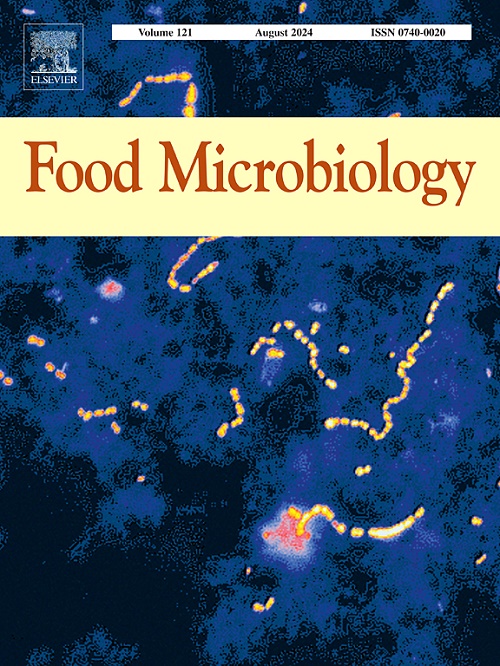预暴露压力对普通、布里提果肉和橘子副产品发酵奶产品中嗜酸乳杆菌的生长和活力的影响
IF 4.5
1区 农林科学
Q1 BIOTECHNOLOGY & APPLIED MICROBIOLOGY
引用次数: 0
摘要
酸奶和发酵乳中益生菌活力的丧失是生产酸奶和发酵乳的一大挑战。因此,将益生菌预先置于压力条件下是提高益生菌活力的一种可行替代方法。此外,在这些产品中使用果肉和农用工业残渣在促进益生菌生长和提高益生菌活力方面已取得了可喜的成果。因此,本研究旨在评估酸奶和天然发酵奶中预先暴露于酸、氧化和渗透压力对嗜酸乳杆菌的生长和活力的影响,这些酸奶和天然发酵奶中含有布里蒂(Mauritia flexuosa Mart.)果肉或橙子副产品。将嗜酸乳杆菌分别预先置于酸、氧化和渗透压力下,并用于酸奶和发酵乳的生产,以确定酸化曲线和培养物的生长情况。此外,在冷藏过程中,还对酸奶和发酵乳中添加的微生物培养物的酸化后概况和存活率进行了监测。结果表明,预暴露于压力条件下会影响嗜酸乳杆菌以及嗜热杆菌和保加利亚鼠李糖亚种启动培养物的生长速率(μ)和滞后期(λ)等生长参数。此外,与无压力条件相比,在含有橘子副产品的天然酸奶贮藏第 21 天时,观察到嗜酸乳杆菌(预先暴露于酸压力)的活力增加。这项研究报告了关于益生菌培养物在添加了果肉和农用工业残留物的产品中预先暴露于压力条件下的生长情况的新数据,这些数据在文献中还没有出现过。本文章由计算机程序翻译,如有差异,请以英文原文为准。
Impact of pre-exposure stress on the growth and viability of Lactobacillus acidophilus in regular, buriti pulp and orange byproduct fermented milk products
The loss of probiotics viability in yogurts and fermented milk is a significant challenge in producing yogurt and fermented milk. Thus, pre-exposure of probiotics to stress conditions can be a viable alternative to increase the probiotic viability. Moreover, the use of fruit pulp and agro-industrial residues in these products has demonstrated promising results in promoting growth and improving the viability of probiotics. Thus, this study aimed to evaluate the effects of pre-exposure to acid, oxidative and osmotic stress on the growth and viability of Lactobacillus acidophilus in yogurts and naturally fermented milk containing buriti (Mauritia flexuosa Mart.) pulp or orange byproduct. L. acidophilus was individually pre-exposed to acid, oxidative, and osmotic stress and used in the production of yogurts and fermented milk to determine both the acidification profile and growth of the cultures. Furthermore, during cold storage, the post-acidification profiles and viability of microbial cultures added to the yogurts and fermented milk were monitored. Results showed that pre-exposure to stress conditions influenced the growth parameters as the growth rate (μ) and lag phase (λ) of L. acidophilus and the starter cultures of S. thermophilus and L. delbrueckii subsp. bulgaricus. Moreover, an increase in the viability of L. acidophilus - pre-exposed to acid stress - was observed on the 21st day of storage of natural yogurts containing orange byproduct compared with non-stressful conditions. This study reports new data on the growth of probiotic cultures pre-exposed to stress conditions in products added of pulps and agro-industrial residues, which have not yet been shown in the literature.
求助全文
通过发布文献求助,成功后即可免费获取论文全文。
去求助
来源期刊

Food microbiology
工程技术-生物工程与应用微生物
CiteScore
11.30
自引率
3.80%
发文量
179
审稿时长
44 days
期刊介绍:
Food Microbiology publishes original research articles, short communications, review papers, letters, news items and book reviews dealing with all aspects of the microbiology of foods. The editors aim to publish manuscripts of the highest quality which are both relevant and applicable to the broad field covered by the journal. Studies must be novel, have a clear connection to food microbiology, and be of general interest to the international community of food microbiologists. The editors make every effort to ensure rapid and fair reviews, resulting in timely publication of accepted manuscripts.
 求助内容:
求助内容: 应助结果提醒方式:
应助结果提醒方式:


